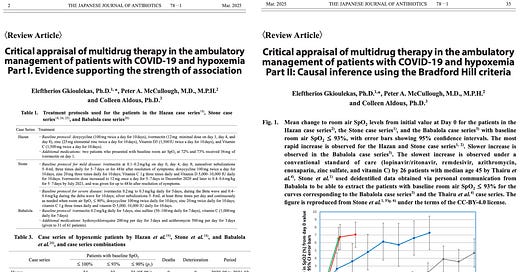BREAKING STUDY — Ivermectin-Based Treatment Protocols Linked to 100% Survival in Hypoxemic COVID-19 Patients
Two-part peer-reviewed study finds rapid recovery and zero deaths among 119 COVID-19 patients treated with ivermectin-based multidrug regimens across the U.S., Zimbabwe, and Nigeria.
The McCullough Foundation-supported study, led by mathematician Dr. Eleftherios Gkioulekas, titled Critical Appraisal of Multidrug Therapy in the Ambulatory Management of Patients with COVID-19 and Hypoxemia, was just published after successful peer-review in two parts in The Japanese Journal of Antibiotics:
Part I. Evidence supporting the strength of association:
This critical appraisal is focused on three published case series of 119 COVID-19 patients with hypoxemia who were successfully treated in the United States, Zimbabwe, and Nigeria with similar off-label ivermectin-based multidrug treatments that may include ivermectin, nebulized nanosilver, doxycycline, zinc, Vitamins C, and Vitamin D, resulting in rapid recovery of oxygen levels. We used a simplified self-controlled case series method to investigate the association between treatment and the existence of hospitalization rate reduction. External controls of hospitalized patients were compared against the subgroup of patients with baseline room air SpO2 ≤ 90% to investigate the association between treatment and the existence of mortality rate reduction. No deaths were reported in any of the three case series. One case series reported 5 hospitalization equivalent events (2 ventilations and 3 uses of supplemental oxygen). Combined, the three case series comprised 119 patients of which 61 patients presented with baseline room air SpO2 ≤ 90%. All appropriate external controls were lower-bounded by 12% case fatality rate for hospitalized patients. The existence of hospitalization rate reduction was statistically significant and resilient against both random and systemic selection bias for two out of three case series with the most aggressive treatments. The existence of mortality rate reduction was statistically significant when at least the two case series with the most aggressive treatments were combined. It is more likely than not that random selection bias alone cannot explain this reduction in mortality. These results established an association between the two most aggressive ivermectin-based multidrug treatment protocols and reduction in hospitalization and mortality for hypoxemic COVID-19 patients.
Part II: Causal inference using the Bradford Hill criteria:
We continue the critical appraisal of three published case series of 119 COVID-19 patients with hypoxemia, treated in the United States, Zimbabwe, and Nigeria with similar ivermectin-based multidrug treatments, to assess the available evidence supporting a causal relationship between treatment and reduction in hospitalizations and mortality. A narrative review was conducted to assess the Bradford Hill criteria for a causal association. We used a previously proposed refinement of the Bradford Hill criteria that reorganized them into three categories of direct, mechanistic, and parallel evidence. The efficacy of the two most aggressive ivermectin-based multidrug protocols is supported by the Bradford Hill criteria for temporality, strength of association, biological gradient, biological plausibility, coherence, consistency, and analogy. The causal relation between the treatment of hypoxemic COVID-19 patients using these protocols and the reduction in hospitalizations and mortality is supported as an inference to the best explanation.
Here are the key takeaways:
Rapid Recovery with Ivermectin-Based Multidrug Protocols: All three case series—conducted in the United States (Hazan), Zimbabwe (Stone), and Nigeria (Babalola)—reported rapid recovery of peripheral oxygen saturation (SpO₂), often within 24–48 hours of initiating treatment. Protocols included off-label combinations of ivermectin, doxycycline, nebulized nanosilver, zinc sulfate, vitamin C, and vitamin D, with some cases also involving aspirin, prednisone, enoxaparin, ceftriaxone, hydroxychloroquine, and azithromycin.
Zero Mortality Among Treated Patients: No deaths were reported among the 119 COVID-19 patients treated across the three case series, including 61 patients with baseline room air SpO₂ ≤ 90%—a severity level typically requiring hospitalization.
Significant Reductions in Hospitalization and Mortality: Using a self-controlled case series method and comparison with external controls, the studies found statistically significant reductions in both hospitalization and mortality rates, especially with the more aggressive treatment regimens used in the Hazan and Stone protocols.
Mechanistic Support for the Multidrug Approach: The combination therapies demonstrated biological plausibility, targeting multiple phases of COVID-19 pathogenesis. Mechanisms of action include antiviral effects (ivermectin, nanosilver, doxycycline), immune modulation (vitamin D, ivermectin, doxycycline), and anticoagulation (aspirin, enoxaparin), contributing to the rapid resolution of hypoxemia and prevention of disease progression.
Meets Bradford Hill Criteria for Causality: The analysis satisfied seven Bradford Hill criteria—temporality, strength of association, biological gradient, biological plausibility, coherence, consistency, and analogy—supporting a causal relationship between the multidrug treatment and observed clinical benefits.
Ethical and Urgent Rationale for Use: In line with Article 37 of the 2013 Helsinki Declaration, these results justify the compassionate, off-label use of repurposed drugs in outpatient settings during a public health emergency.
In the future, our public health agencies must not block the use of actual safe and effective treatments, such as those detailed in this study, in favor of experimental and deadly gene-based injections. This catastrophic failure cost lives and shattered public trust. Moving forward, it is imperative that treatment decisions be guided by real-world evidence and clinical outcomes—not political agendas or pharmaceutical influence.
Epidemiologist and Foundation Administrator, McCullough Foundation
www.mcculloughfnd.org
Please consider following both the McCullough Foundation and my personal account on X (formerly Twitter) for further content.






Finally studies that match with reality. Now let's expose cancer. Antiparasitics anyone?
Our otherwise healthy dad was denied IVM & HCQ in FL in 2021 because the doctors said “there’s no evidence to support their use.” Our dad was doing fine in the hospital until the doctors gave him 5 days of Remdesivir. Like so many others, he was isolated, ventilated and died 2 weeks later. Whoever determined the Covid hospital protocols should be brought to justice. And the doctors and administrators who were either negligent or exercised willful blindness should be made to admit to their culpability in all of these unnecessary deaths. The only silver lining I can find in this awful, painful experience is that I will never trust a doctor again without doing comprehensive research on my own.